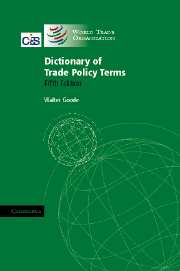Summary
Gaiatsu: a Japanese expression meaning pressure from outside. It is used to describe, both in Japanese and in foreign-language texts, the pressure sometimes brought to bear on Japan by other countries to reform this or that policy.
Gains-from-trade theory: that part of the theory of international economic relations which demonstrates that two countries with different price structures are maximizing their economic returns if they trade with each other rather than pursuing autarky. The gain lies in the ability of either country to buy more at a lower cost from the other than it would be if it attempted to be self-sufficient. The consequence is specialization in production. See also absolute advantage, comparative advantage, Heckscher-Ohlin theorem, globalization, international division of labour, internationalization, self-reliance and self-sufficiency.
Gate-keeper effect: control by a company of an infrastructure facility that is essential for others to develop their businesses. See also essential facilities doctrine.
GATS: see General Agreement on Trade in Services.
GATS 2000: refers to the new round of negotiations on trade in services mandated by Article XIX of the General Agreement on Trade in Services which began in 2000 and which has been subsumed in the Doha Development Agenda.
GATT:General Agreement on Tariffs and Trade. This has two meanings. The first is the international organization and the secretariat that administered the Agreement.
- Type
- Chapter
- Information
- Dictionary of Trade Policy Terms , pp. 185 - 209Publisher: Cambridge University PressPrint publication year: 2007
- 1
- Cited by



